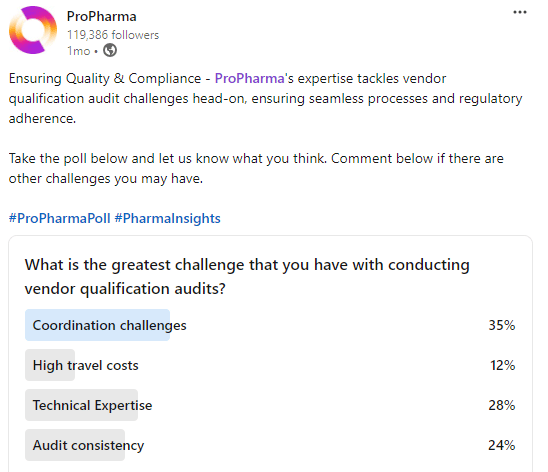In today's dynamic business landscape, organizations in the drug, biologics, and medical device industries face the dual challenge of delivering quality products while managing tighter budgets and ensuring compliance with evolving regulatory standards. As companies strive to enhance product quality and meet stringent regulatory requirements to ensure the safety and efficacy of their products, vendor audits play a pivotal role. These audits verify vendor’s adherence to GxP (Good Practice) guidelines and enable organizations to identify and address potential risks and deficiencies in their supply chain. However, navigating the complexities of global supply chains and evolving regulatory standards presents a significant challenge. How can organizations effectively manage vendor audits while maximizing cost efficiency in the face of these financial pressures?
In this blog post, we explore the financial implications of conducting vendor audits internally versus outsourcing them to consulting firms. We present the multifaceted challenges faced by companies in the audit process, from time-consuming coordination efforts to high travel expenses and the need for specialized technical expertise. Drawing from insights gathered through a recent poll, we uncover the real-world experiences and perceptions of industry professionals, shedding light on the financial toll of performing audits internally and the potential benefits of outsourcing this critical function.
Challenges of a Vendor Audit Program: Insights from Our Poll
According to our recent poll asking respondents to highlight the greatest challenges faced in managing their vendor qualification audits, the answers highlighted a range of obstacles. Among the responses, 35% cited audit coordination challenges as their greatest hurdle, followed by 28% who identified GxP technical expertise, 24% who expressed concerns about audit consistency, and 12% who cited high travel costs.
Let's look closer at each of these challenges and explore their implications for companies' bottom line:
- Time-Consuming Scheduling and Coordination Efforts (35%): Most respondents identified coordination challenges as a significant hurdle in conducting vendor audits internally. This aligns with the common struggle faced by companies, as the process of scheduling auditors and coordinating with the audited companies can be highly time-consuming and resource intensive. These efforts not only drain internal resources but also result in opportunity costs as valuable time that could be spent on other critical tasks is diverted towards audit coordination.
- Challenges in Accessing Specialized Technical and Auditing Expertise (28%): Nearly a third of respondents emphasized the importance of accessing specialized GxP technical expertise as a significant challenge in performing vendor audits. In today's highly regulated industries, ensuring compliance with GxP guidelines and other regulatory requirements demands specialized knowledge and experience. However, company audit teams may lack the necessary expertise to thoroughly assess vendors' adherence to regulatory standards or evaluate specific systems requiring niche expertise, leading to potential compliance risks and inefficiencies.
- Maintaining Consistency and Quality Across Audit Processes (24%): A significant portion of respondents expressed concerns about maintaining consistency across audit processes internally. Consistency is crucial for ensuring the reliability and accuracy of audit findings, and for benchmarking vendor performance over time. However, without standardized audit methodologies and quality assurance processes, audit teams may struggle to achieve uniformity in their audit approaches, resulting in varying levels of effectiveness and reliability.
- Travel Costs (12%): While fewer respondents cited high travel costs as their greatest challenge, this remains a notable concern for companies conducting on-site audits at vendor facilities across different geographic locations. From airfare and accommodation to transportation and meals, these expenses can significantly impact the overall cost of conducting audits internally, putting strain on already tight budgets.
These poll results provide insights into the financial costs and resource implications of conducting vendor audits internally. As companies seek to optimize cost efficiency and enhance audit effectiveness, the case for outsourcing vendor audits to consulting firms becomes increasingly compelling.
Understanding the Financial Benefits of Outsourcing
Outsourcing vendor audits to consulting firms offers several financial advantages that directly impact companies' bottom line and operational efficiency. Let's explore these benefits in detail:
- Time-Saving Advantages: Outsourcing vendor audits enables companies to save valuable time by leveraging the expertise and resources of consulting firms. With the ability to quickly schedule auditors and reduce coordination efforts, companies can streamline their audit processes and focus their internal resources on core business activities. By avoiding the time-consuming tasks associated with audit coordination and travel logistics, organizations can achieve significant time savings, allowing for greater productivity and efficiency.
- Access to Specialized Expertise: Consulting firms bring specialized technical and regulatory knowledge to the table, providing companies with access to expertise that may not be available internally. By leveraging the technical and regulatory knowledge of consulting firms, companies can ensure compliance with GxP guidelines and other regulatory requirements, mitigating risks and avoiding potential compliance issues. Their specialized expertise not only enhances the quality and effectiveness of audits but also reduces the likelihood of costly regulatory violations and penalties.
- Improved Audit Consistency: Outsourcing vendor audits to consulting firms ensures consistency in audit processes and methodologies. Top consulting firms bring established audit protocols and quality assurance processes that are consistently applied across all audit engagements. By adhering to standardized audit methodologies, consulting firms deliver consistent and reliable audit outcomes, ensuring that all vendors are assessed using the same criteria and benchmarks. This consistency enhances the credibility of audit findings and facilitates benchmarking and trend analysis, allowing companies to identify areas for improvement and drive continuous process optimization.
- Reduced Travel Expenses: Consulting firms often have globally located auditors, allowing them to conduct audits without the need for extensive travel by client personnel. Utilizing locally based auditors helps companies minimize travel expenses associated with on-site audits at vendor facilities across different geographic locations. Therefore, a reduction in travel expenses contributes to overall cost savings and enhances the financial attractiveness of outsourcing vendor audits to consulting firms.
- Scalability and Flexibility: Outsourcing allows companies to scale their auditing efforts up or down based on business needs without the fixed costs associated with maintaining an in-house audit team, which can lead to significant cost savings during periods of low audit activity.
- Efficiency Gains and Faster Time-to-Market: Because consulting firms with dedicated audit services teams have streamlined processes and focus on efficiency, companies typically see faster turnaround times when compared to their in-house audit team. Accelerating the audit process can lead to quicker vendor qualification, reducing time-to-market for new products and ultimately increasing revenue potential.
- Access to Advanced Technologies and Tools: Consulting firms often invest in advanced auditing technologies and tools that can improve the efficiency and effectiveness of audits. By leveraging these technologies, companies can reduce manual effort, improve data accuracy, and achieve cost savings over time.
- Global Reach and Compliance: For companies operating in multiple regions or countries, outsourcing audits to consultants with global reach ensures compliance with diverse regulatory requirements. Avoiding non-compliance penalties and maintaining a consistent standard across different markets can lead to substantial cost savings and operational efficiencies.
Direct Translation into Cost Savings and Operational Efficiencies
Each of these benefits directly translates into cost savings and operational efficiencies for companies. By saving time on audit coordination and travel logistics, organizations can reduce administrative overhead and allocate resources more efficiently. Access to specialized expertise enables companies to avoid costly compliance issues and regulatory violations, minimizing the potential financial impact of non-compliance. Similarly, improved audit consistency ensures that companies can make informed decisions based on reliable and consistent audit findings, leading to more effective risk management and resource allocation.
Overall, outsourcing vendor audits to consulting firms offers a strategic approach for companies seeking to optimize cost efficiency and enhance operational effectiveness. By capitalizing on the multiple advantages provided by consulting firms, organizations can achieve significant cost savings and operational efficiencies while ensuring regulatory compliance and mitigating risks.
Maximize Cost Efficiency Through Outsourcing
Outsourcing vendor audits to consulting firms can bring a multitude of financial benefits for companies in the pharmaceutical and medical device industries, and organizations can realize significant cost savings, operational efficiencies, and compliance advantages.
As companies navigate the complexities of regulatory compliance and strive to deliver quality products in a cost-effective manner, the long-term cost-efficiency of outsourcing vendor audits becomes increasingly apparent. By embracing outsourcing as a strategic solution, companies can optimize their audit processes, enhance compliance outcomes, and drive financial performance in today’s competitive landscape.
Outsource Your Audit Needs to the Experts at ProPharma
At ProPharma, we invite you to elevate your quality and compliance program with our global compliance team of GxP auditors. Whether you require single audits or comprehensive vendor management programs, we deliver bespoke audit support that meets your specific needs. Our expertise spans across all regulatory lifecycle stages, ensuring alignment with the latest industry trends, evolving regulations, and standards in GxP auditing. To speak with one of our audit leaders, contact us today and tell us how we can help.




